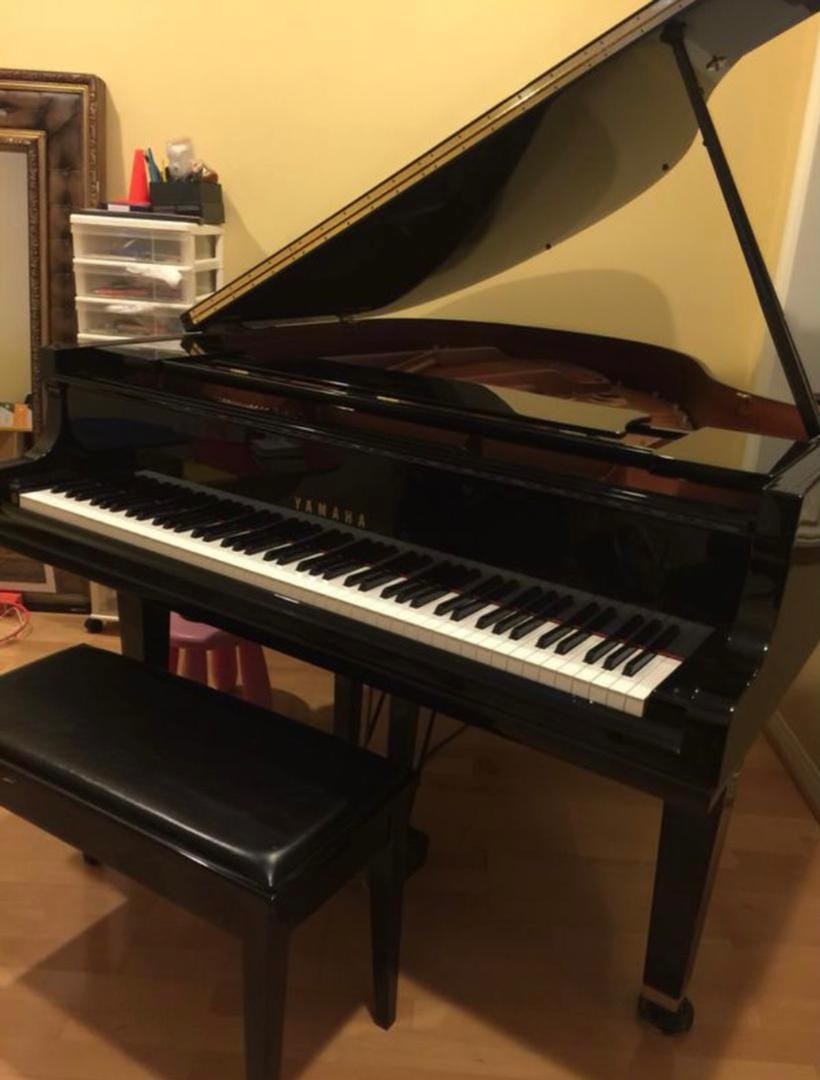The Great Grand Piano Scam
And other examples of musical fraud
I almost got scammed a few years ago. A woman hit me up on Instagram asking if I wrote songs. “Of course,” I responded. She then sent a long message asking if I could compose a song for her son Daniel’s sixth birthday. She claimed she’d pay me $500. I agreed. I already wrote and recorded music regularly. It sounded like an easy $500. Then the scam emerged.
After I sent the song, the delighted woman told me that she had a check that she would mail me. There was an issue, though. The bank accidentally made the check out for $5,000 instead of $500. She wanted to know if she could send me the $5,000 and then have me send $4,500 back. At this point, I realized it was some sort of check scam, so I blocked her and forgot about it pretty quickly. But last week this scam came rushing back when someone tried to scam me in an even stranger way. As always, this newsletter is also available as a podcast. Listen on Spotify and Apple Podcasts or click play at the top of this page.
Sing Us a Song, You’re the Piano Scam
Every few weeks, I’ll peruse the junk folder within my email to make sure that an important communication wasn’t errantly marked as spam. During my most recent perusal, one subject line caught my eye: “Do you know anyone who is interested in a Yamaha baby grand piano?” I clicked in to find the following message:
Hi,
I hope this message finds you well.I'm in the process of moving and would like to donate a Yamaha baby grand piano that used to be owned by my late Husband, to someone who is passionate about the instrument and can take proper care of it.
If you are interested or know someone,please let me know the location.
Given the typographical errors, the fact that I was Bcc’d on the message, and that almost no one would honor their dead husband by giving away a baby grand piano to a stranger online, I knew this was a scam. But I write a newsletter about music. So, I decided to play along to try to understand the contours of how it worked in hopes that might prevent someone from being duped in the future.
I asked my new “friend” for details on the piano, where it was located, why she’d reached out to me, and if there were any costs involved. She got back to me to me later the next day.
Dear Chris,
Thank you for your response and willingness to give my late Partner's piano a decent home. I specifically reached out to you because you were referred to me. The Yamaha Baby Grand Piano GC1 model used to be owned and played by my partner who passed away last year, the dimension is "151cm by 146cm" . It was last tuned sometime last year before He /She passed. She's about 3 years old and in an impeccable condition.
I moved my properties to Arkansas recently and I don't think my husband will be happy if I sell this piano, So I'm hoping to give it out to someone who is a passionate lover of the instrument.
The Piano is currently in storage in Little Rock Arkansas with the movers I employed to move my properties from my house. The movers can deliver anywhere within the states. However, the beneficiary has to pay moving costs. I look forward to reading from you soon.
My favorite part about this response was the sentence, “It was last tuned sometime last year before He /She passed.” Clearly, this person was copying from some script and forgot to choose the gender of their fictional dead spouse. The error aside, a photo of the piano was attached to assuage any doubts that I might have.
Despite the fact that a reverse image search revealed that this exact image was found elsewhere online, I pressed on. I wanted to see if there were any limits to the scam. I asked if they would deliver to me in Utqiagvik, Alaska, one of the northernmost cities in the United States. Here’s the response I got:
The movers can deliver anywhere within the states so Alaska is among the destinations they deliver. However, all you need to do now is to contact them and make arrangements as regards the moving process.
Here is the movers information:https://speedicargo.com.. Just let them know I referred you.Make sure to send an email for a faster response. Most importantly, provide your address for a delivery quote.
I would like you to keep me updated with the movers and send me some pictures when they arrive at your address.
Given that I’m not an investigative journalist, my correspondence didn’t go much further than this. The scam is so widespread that others have documented where it goes from here, though. Basically, the mover will quote you a price. You’ll send money to move the “free” piano. Then you never hear from them again.
Though I found the exact details of this scam a bit odd, scams are very common in the music industry, especially those focused on young artists. I asked Brian Zisook, Audiomack’s EVP of Global Operations and one of the internet’s leading educators on music scams, about the most common ways he see artists get duped. Here’s what he told me:
Scammers prey on young, hungry, naïve artists who openly display a willingness to do anything to make it in music. Using social media and email, these scammers spray their messaging far and wide, often in a generic fashion, through unsolicited communications. No matter the approach, the message is always the same: “If you want to fulfill your dreams, you need to invest in your career, and it starts with giving us your money for (fill in the blank).” That could be a supposed meeting with a major label A&R, a record contract, a playlist add, or an opening slot on a festival bill. A good rule of thumb: if it seems too good to be true, it probably is.
But why do these scams seem so much more common in music than they do in other spaces? I think it becomes clear when you compare someone trying to establish themselves making original music to, say, someone trying to do the same as an accountant.
Becoming a Certified Public Account is not easy. Along with needing 150 college credits — 30 more than a normal undergraduate degree — you need to pass a difficult exam and complete continuing education each year. Despite that, if you want to become a Certified Public Accountant, the path is clear. I just laid it out for you in a single sentence.

Compare that to becoming a musician who performs original music. You’ve got to record some songs. You’ve got to play some shows. You’ve got to hope the right people hear said songs or come to said shows. If all that happens, then maybe a label will help you turn your musical hobby into a full-time job. When the path is as ill-defined and luck-dependent as this, it’s easy for shady figures to swoop in and try to sell you a dream. It’s much harder to do that in the world of accounting. You’ve either taken the courses and passed the test or not.
Furthermore, consider a middle-class career in both of these fields. According to the U.S. Bureau of Labor Statistics, the median annual salary for an accountant is about $80,000. In other words, the average account is more than getting by, especially when you consider the ancillary benefits that accompany many jobs in the field. If you are trying to pursue a career making original music, a middle-class life couldn’t be more different. In fact, I’d go so far as to say that middle-class almost doesn’t exist in that world. Again, this incentivizes the proliferation of fraudsters selling dreams for a quick buck.
In short, be careful out there, especially if you are an aspiring artist. People don’t offer record contracts unprompted. They also don’t give strangers free pianos. To quote my colleague Brian Zisook again, “If it seems too good to be true, it probably is.”
A New One
"Nereikia Žodžių" by Sel ft. Lit
2024 - Downtempo
Last week, I was searching for the Childish Gambino’s new song “Lithonia” when I accidentally ended up on a Lithuanian pop music playlist. Unfamiliar with the music of the Baltics, I decided to click around. I was immediately hypnotized by this slow-burning electronic track by two monosyllabic artists, Sel and Lit. I wish I could give you more context, but everything I can find online is in Lithuanian.
An Old One
"I Think We’re Alone Now" by Tommy James & the Shondells
1967 - Rock
Music industry scams are nothing new. And it’s not just nameless artists getting scammed. It also happens to those who are topping the charts, like Tommy James. Scoring two number ones and 12 other top 40 hits, James and his group the Shondells were one of the biggest American rock bands of the late-1960s. The problem? The group was signed to Roulette Records.
Roulette Record was a front for the Genovese crime family run by the iron-fisted Morris Levy. Later convicted of extortion, Levy notoriously gave himself writing credits on songs put out on Roulette and withheld millions in royalties from his artists. All I can hope is that eventually James and his bandmates managed to make some money from some of their masterful rock records.
Shout out to the paid subscribers who allow this newsletter to exist. Subscribers get four additional newsletters each month and access to our archive. Consider becoming a paid subscriber today!
Recent Paid Subscriber Interviews: Royalty-Free Music • Microphone Engineer • Spotify’s Former Data Guru • Running an Independent Venue • John Legend Collaborator • Broadway Star • What It’s Like to Go Viral • Adele Collaborator
Recent Newsletters: What Happened to Instrumentals? • I Miss You, Buddy Holly • Blockbuster Nostalgia • Pop Songs & Baby Names • Recorded Music is a Hoax • On Dying Young • Selling Out
Want to hear the music that I make? Check out my latest single “Late Nite Kicks” wherever you stream music.




When in college I struggled on whether to do music or accounting. I decided I didn't want to be a starving artist and am now a CPA, lol.
I still did music on the side , even had a number one on soundclick. But never made any money.
I'm happy with my decision
Why Yamaha? Wouldn’t Steinway be more prestigious?